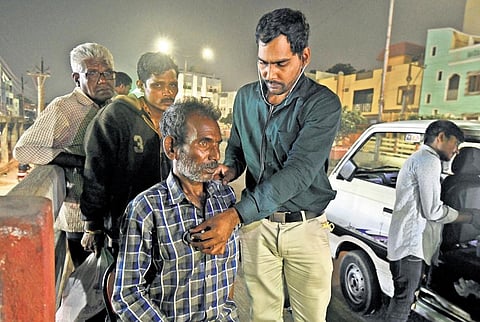

HYDERABAD: Mapping the road with a walking stick, 62-year-old Mohammad Jahangir climbed the footpath on Dabeerpura flyover and sat on a fragile chair next to a doctor. The darkness of the evening and the loneliness in the air has been enveloping his life since his early childhood memories.
Living on the streets as a blind person is indeed challenging, as he recently fell into a gutter and injured his leg. The doctor checked his wound, applied antiseptic, and retrieved the medicines from a white Omni van. The open door of the van displayed the words “Aman Vedika Street Medicine for Urban Homeless.”
For the last 7 years, Aman Vedika, a non-profit service society has been providing free healthcare services to homeless people in Hyderabad. A team consisting of a doctor, a nurse, a driver and a medical social worker treats the patient and gives them primary medicines for acute diseases like cold, cough and fever. Patients also get diagnosed with chronic diseases and are referred to government hospitals in case of severe complications.
The van covers 22 points in five prominent areas of Hyderabad for five days from Monday to Friday. “These areas are selected on the basis of a survey conducted by Aman Vedika a few years ago to locate areas in the city where the prevalence of homeless is higher,” said Sayed Feroz, co-ordinator of the project.
It all started when the members of Aman Vedika recognised the need for healthcare services for homeless people living in its shelters. “Homeless often hesitate to visit any healthcare centre with the fear of being treated badly based on their appearance, clothing and behaviour,” Feroz added. Initially, the team had decided to distribute medicines only. However, as we ventured into the field, the need for having a doctor’s consultation, and a nurse to dress for injuries which are quite common in the homeless was recognised.
A list of essential medicines, ointments, Oral Rehydration Solution (ORS), and painkillers was also prepared. A standard procedure was also prepared to keep track of the patient’s medical history. With the help of donors, the minimum honorarium is now being provided to the volunteers. Each new member joining the team is first being trained by the organisation.
Jahangir was one among 40 patients who were treated by the team on November 3. Testing 10 to 15 patients at the flyover, the small clinic-type setup was wrapped up and the vehicle moved forward. “Dawai, Medicine, Goli,” the medical social worker, K Ramprasad, shouted, peeping out of the slowly moving vehicle wherever he saw homeless people. Not less than a kilometre ahead the vehicle stopped again. This time, a couple of women joined the queue of patients.
“Your Name and village?” Dr Rajender Arsam, a general physician working with the team for the last 4 years, asked to make a note of it in the register. “Sir, Meru Jyothi,” the regular patient of the team replied in Telugu. Jyoti, who has been living on the streets for the last 8-9 years and lost her left hand in a road accident, is five months pregnant. Her first baby was born dead due to poor nutrition. Raghunathan Pillai, another trained medical social worker, fetched some iron tablets from the box of medicines and explained their importance. Whereas, V Renuka, the nurse counselled her to get a scan done to check the baby’s growth.
“Women mostly suffer problems regarding urinary tract infection,” Dr Rajender said. While he has treated patients with various types of diseases, most of them were suffering from diabetes, hypertension, dehydration, severe cough in those who consume alcohol and smoke and tuberculosis among others. Providing care to other patients, the vehicle again moved ahead to have another set up at the Kacheguda Railway Station where another set of patients were already waiting to get them checked by the doctor.